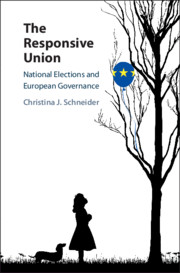Book contents
- Frontmatter
- Dedication
- Contents
- List of Figures
- List of Tables
- Acronyms
- Acknowledgements
- 1 Responsive Governance in the European Union
- 2 The Politicization of European Cooperation
- 3 Signals of Responsiveness: A Theory
- 4 The EU-Aware Voter
- 5 The EU Budget: Financially Trivial, Politically Substantial
- 6 Triumph and Agony in the 2007–2013 MFF Negotiations
- 7 The Legislative Leviathan Marionette
- 8 The Waiting Game: Après les élections, le déluge
- 9 When the Music Stops: The German Politics of the Greek Bailout
- 10 The European Republic
- References
- Index
4 - The EU-Aware Voter
Published online by Cambridge University Press: 29 October 2018
- Frontmatter
- Dedication
- Contents
- List of Figures
- List of Tables
- Acronyms
- Acknowledgements
- 1 Responsive Governance in the European Union
- 2 The Politicization of European Cooperation
- 3 Signals of Responsiveness: A Theory
- 4 The EU-Aware Voter
- 5 The EU Budget: Financially Trivial, Politically Substantial
- 6 Triumph and Agony in the 2007–2013 MFF Negotiations
- 7 The Legislative Leviathan Marionette
- 8 The Waiting Game: Après les élections, le déluge
- 9 When the Music Stops: The German Politics of the Greek Bailout
- 10 The European Republic
- References
- Index
Summary
The chapter offers a test of a central assumption of my theory that voters hold their governments accountable for responsive behavior at least when policy issues are politicized domestically. I use a survey experiment to analyze how publics respond to different signals of government responsiveness. To examine how voters respond to different signals of political responsiveness, and to assess the internal validity of the demand side of political responsiveness, I conducted two conjoint experiments that were embedded in an online survey of over 2,500 Germans in the fall of 2016 on two salient policy areas – whether to agree to another financial rescue package for Greece and whether to allow for more immigration of refugees and asylum seekers into the EU. I find that voters are more likely to vote for politicians if they present the voters' favored policy position, if they defend this position throughout the negotiations, and if they are successful in achieving their preferred outcome. Similarly, voters blame governments for pursuing unfavored positions, and for their inability to achieve favored negotiation outcomes. Signals of responsiveness matter for vote choice even though respondents could have easily chosen politicians based on their partisan ideology; a trait that tends to be one of the strongest predictor of vote choice in Europe.
Keywords
- Type
- Chapter
- Information
- The Responsive UnionNational Elections and European Governance, pp. 72 - 92Publisher: Cambridge University PressPrint publication year: 2018

